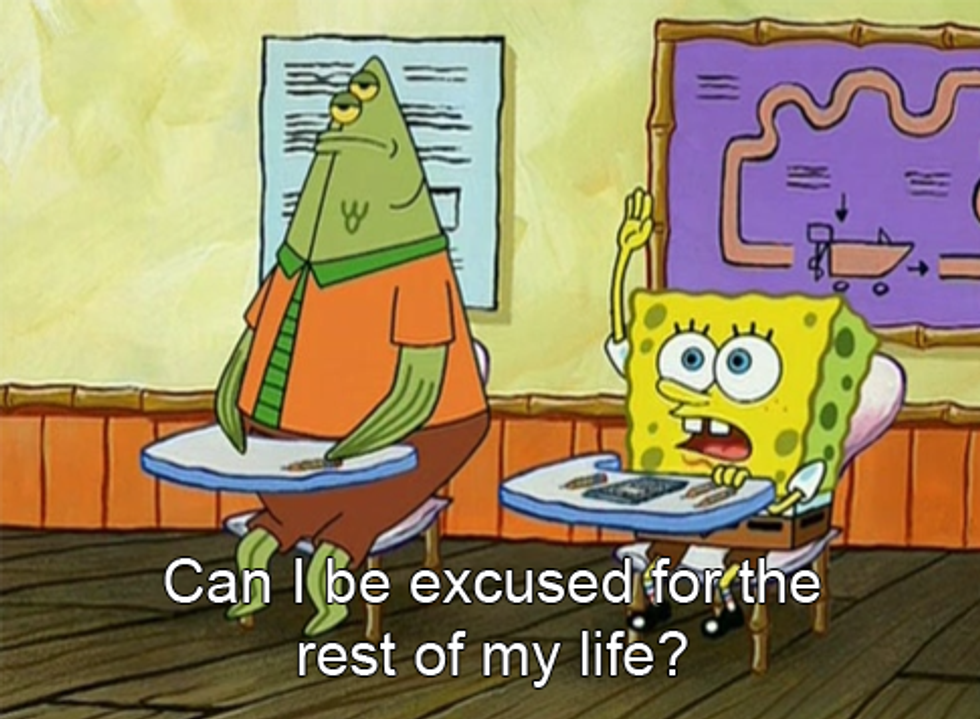In lieu of domestic violence awareness month, I have finally built up my courage to speak out and bring awareness to another type of abuse is far too common but has not been nearly spoken enough about. This year has been rough, to say the least, and I have been called things I would have never imagined to ever be called. Out of all these awful names, there’s one that is still the hardest say out loud: emotionally abused. I have always been aware of the existence of emotional abuse, but always connected it to married housewives or someone in an older age category. Not recent college graduates, or rising young professionals, and definitely not me.
It’s hard to identify this kind of abuse because nowadays, insults like whore or slut are thrown around so loosely and this type of language is often passed off as normal. People going through this kind of abuse often don’t understand why it makes them feel so bad. We see these insults and comments as “not a big deal.” People around them will also minimize the impact, because it they see it so often and it seems so common… “it’s really not that bad.”
Recognizing the Signs of Emotional Abuse
By definition, emotional abuse is when a person (or people) treats someone badly enough to parallel the same psychological feelings as physical harm including: fear, depression, or trauma. The brain processes the harm done by emotional abuse the same way as if you had been physically hit. In her book The Verbally Abusive Relationship, Patricia Evans states that the damage done by emotional abuse is greater and takes longer to heal than a physical wound. Emotional abuse is not just when your boyfriend/ ex-boyfriend hurts your feelings; it is a series of repeated incidents that insults, threatens, isolates, degrades, and humiliates, in order to control another person. A cycle, consisting of these “incidents,” apologies, and calm waters until the inevitable repetition.
Some examples of emotional abuse are:
- Degrading comments or insults towards you: disgusting slut, hoe, stupid bitch
- Constantly dismissing your opinion like it doesn’t matter: You are not worthy of respect, You DESERVE to be used
- Using sarcasm/ joking around to put you down in harshly: Laughing at you or your fears
- Belittling or crushing your accomplishments or goals
- Making excuses and never saying sorry
- Dismissing your anger/ pain as invalid: When you do become angry, he shoves it back at you to prove how “irrational” you are. The privilege of rage (or pain) is reserved for him only.
- Placing the blame on you and making you believe it’s your fault
- Humiliating you in front of others - Even when you’re not there
- Threatening you in order to get what they want or to control your action: If you EVER date someone else, I will f*** them up mercilessly
Some examples of someone who has been emotionally abused are:
- Saying things like: “I don’t like the person I have become”
- Constantly apologizing
- Low-self esteem due to degrading insults
- Needing lots of reassurance
- Breaking down during small disagreements because they’re scared it will get bigger
- Hiding their feelings in fear of upsetting you
As I began going to therapy, I somehow connected to all of these elements. When constantly apologizing to my friends--they would say things like “Calm down, it’s okay,” to my unnecessary over-reactions. The need of constant reassurance--I needed a consistent source of confidence because I was lacking my own. I no longer felt worthy or like I deserved anything valuable. When this happens, you have consequently learned at the hands of your abuser, to question yourself and your own value. As you make decisions, you are very likely to seek out validation for much or what you do or think. I caught myself constantly saying, or thinking, that I hated the person I had become after him. This is because you have been told by your partner/ someone you love who you are and allowed them to define the person you are. And you started to believe it.
I also noticed a change in physical appearance. I simply did not feel like I looked or acted like myself. I had chopped my long hair off and dyed it dark. People asked me more every day if I was tired, or told me I had developed the infamous “RBF”: Resting Bitch Face. Very small details, but all of a sudden it all made sense.
Healing the Wounds
Just like you should never ask a domestic violence survivor why they stayed, you should NEVER be judged for why you left, especially a situation where you felt your own safety and well-being was being compromised. I had heard that statement before, but never fully understood what it meant, until recently.
The first step, the most crucial and probably the hardest step to take, is to block this person out of your life. You want to protect yourself from any further damage. It’s the hardest step to take because you have developed an attachment to this person. This is someone you once loved, or still love, someone you share a deep connection and history with. This type of abuse sets up a dynamic where you come to believe everything is somehow your fault and you must work hard to fix these problems. But it is very necessary to cut the source of negativity out. Amidst the name-calling, the patterns of belittling and mockery, I still felt the overwhelming urge to receive validation from this person, I believed I was at fault and I had to make everything better. I did just about anything to try and change his opinion or shelter his emotions, lowering my values and standards even more. Until I finally had enough and cut him out of my life completely.
You also need a strong support system; be your friends, your family, or even a professional to help guide you. I felt ashamed to tell my friends, until very recently, and I was especially ashamed of telling my parents, despite our close relationship. What would my mom say? She raised me to be stronger than this. But they are the key to being able to move past this, you are never alone.
**One more time for the people in the back** You are NEVER alone.
“Happiness can be found even in the darkest of times, if only one remembers to turn on the light”
A method that really helped me during anxiety attacks (whenever I received another insult or faced confrontation) or when the negative comments started clouding my thoughts, was to write these insults down. Next to each one, I would write exactly why I am not these things, why I am so much more. It’s reassurance coming directly from you. No one knows you better than you know yourself. It sounds silly, and at first it may feel unnatural but it’s really not. (Side Note: I’m a huge Harry Potter fan and this quote has stuck with me through this this process for relevant reasons.)
The easiest thing to do when overcoming adversities is to develop an identity as a victim. Victim identity destroys your personal power and undermines the sense of who you truly are beyond being a victim. Developing a victim identity is a hard cycle to break out of - I find myself guilty of having fallen into this cycle. Appreciating yourself makes you realize how much your loved ones and people around you appreciate you too. It separates who you are as person from the adversities you have experienced. You are not defined by degrading and belittling insults. No, you do NOT deserve to be used and mistreated. Yes, you are truly worthy of love and respect.
Do things that you genuinely enjoy doing, even if you find that you have stopped doing them. I started to run, read, write, and even knit again. It lets your thoughts escape, frees you of the thoughts that are constantly circling in the back of your head. And, like my girl Elle Woods said, endorphins make you happy. Do anything that helps you distance yourself from the damaging negativity. For me, I decided to move 3,000 miles away from home, something I had always wanted to do. It wasn’t that I was running away, but more that I wanted to do something for myself, that I actually wanted to believe I deserved something good like a fresh start. Hence, turning on the light and refusing to stay in the dark.
This is something I am still growing from and, even today, I find it hard to break out of the cycles of guilt and negative thoughts. There is no hand-book on how to go about these situations, no step by step process or a correct reaction to this type of emotional distress, as much as I wished it did. This is why I wanted to share my own experience-- not to tell you how you should deal with your situation but rather as guidance, and a demonstration of support that in fact women (even college women) do encounter this situation more often than noted publicly.
Their voices are often shut down by embarrassment or fear, like mine almost was. But with awareness and a great support system, even the deepest wounds heal, hair grows back, you regain the sense of who you are once again… it’s always darkest before it’s dawn if you will. You come out stronger, knowing who you truly are, not who you were told you are. Please be aware of the signs and know that just because they are not visible bruises, you should not have to take emotional abuse from anyone - no matter what the excuse is.




















